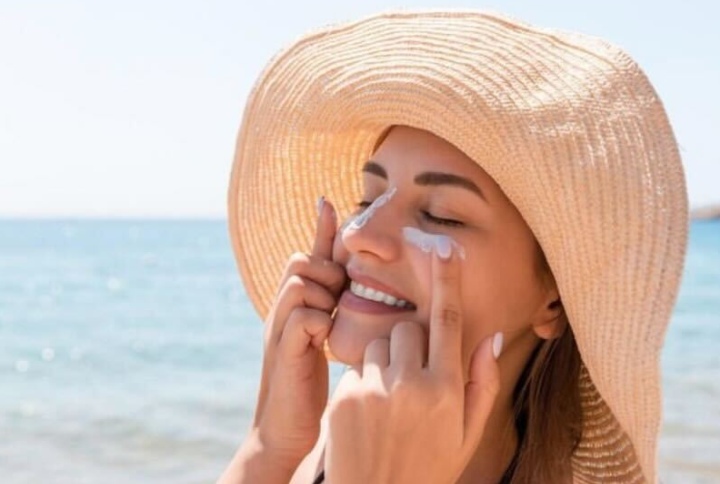Everyone deserves some well-earned time off work because there’s no better way to decompress, rejuvenate and with a replenished state of mind than before. So if you’re already packing for your holiday, we hope you’ve made sure to put in your favourite sunscreen. Even if you aren’t travelling, in a city like Mumbai that is perennially warm with the sun harsh rays shining down on us; you’ll still need good sunscreen. While you still need to soak in all that Vitamin D, the sun’s rays can cause severe skin damage. Direct exposure to these harmful UV rays is a recipe for disaster, making skin protection your biggest concern.
This is why we reached out to Dr Chytra V Anand, CEO & Founder of Kosmoderma Clinics for her expert input on understanding the importance of sunscreen and what you need to look for when buying sunscreen.
Why is sunscreen important?
Prolonged exposure to sunlight can cause freckles; age spots, spider veins, rough and leathery skin, wrinkles, blotchy complexion, and skin cancer. Just as you need water to stay hydrated throughout the day, your skin needs to be protected from the sun. Hence, it is important to include sunscreen in your daily skincare routine. Using sunscreen averts tanning or skin discolouration and helps to keep a ton of other issues at bay. As per the Skin Cancer Foundation, applying sunscreen of at least SPF 15 every day can cut down the chances of developing squamous cell carcinoma by around 40% and melanoma by 50%.
What to keep in mind when buying sunscreen?
The sun emits many ultraviolet rays, with UVA and UVB being the two main types that can harm your skin. A broad-spectrum sunscreen is the most effective defence against both. It is crucial not just for skin cancer prevention but also for preventing UV damage and premature skin ageing. When looking for sunscreen, check for the terms broad spectrum to ensure you’ve found a product worth buying.
Why SPF is important?
The SPF number on your sunscreen indicates how long it would take the sun’s UV radiation to cause sunburn on your skin. Most dermatologists recommend SPF 30 or high as it filters out around 97% of UVB rays. The higher the SPF, the better the protection against UVB radiation. It is advised to use for daily exposure as well even when hanging out with friends or heading to work.
How to choose the right product for your skin-type?
Many sunscreens are explicitly designed for those who have dry, oily, or sensitive skin. Consider your skin type before buying sunscreen. People with dry skin should look for sunscreens that include a moisturiser (cream form) or nourishing ingredients like Physalis Angulata extract. Lightweight or gel lotions are excellent for oily skin since they provide a thicker layer of sun protection that is non-greasy and stays on for an extended period of time without leaving any residue. Avoid products containing alcohol, preservatives, fragrances, and oxybenzone if your skin is sensitive and prone to inflammation.
If you work out or swim a lot make sure to invest in a water and sweat-proof sunscreen. Keep in mind, though, that no sunscreen is completely waterproof; they all wash off eventually. Water-resistant sunscreens have been tested to be effective for up to 40-80 minutes. As a result, you will have to re-apply it.
Ingredients too look for on the back of the product:
The ingredients are one of the most crucial aspects to consider when purchasing sunscreen. A glance at the ingredients list can help ensure that you have the quality and coverage you require. Sunscreens are classified into two types: chemical and physical. Although chemical sunscreen components such as PABA (para-aminobenzoic acid) reduce sun damage, they can induce skin allergies, inflammation, and even pigmentation. So, avoid PABA and opt for natural ingredients, such as Vitamin C antioxidants. It gives your skin time to heal while also giving your immune system a chance to repair free radical damage.
How often should one re-apply sunscreen?
Finding the right sunscreen is simple; the true challenge lies in re-applying it. While the requirements for reapplication vary depending on your sun exposure, activities, and SPF level, experts recommend re-applying after every two hours. Besides this, if you swim or sweat a lot, it is best to re-apply it more frequently.
Usually, people don’t apply enough sunscreen on the first application, which reduces the effectiveness of the sunscreen and causes it to lose its ability to protect the skin. So, use it properly to reap the benefits.
Follow @missmalinibeauty for more on everything makeup, hair and skincare and download the Girl Tribe by MissMalini App to join our fashion and beauty community.

